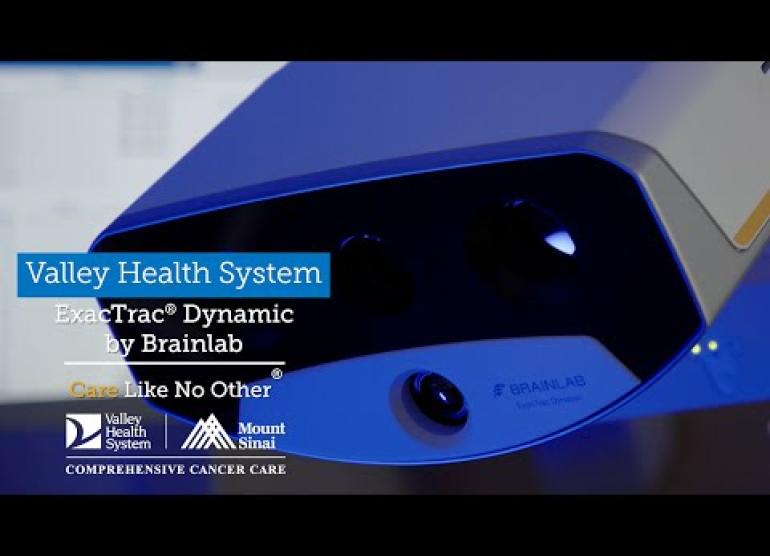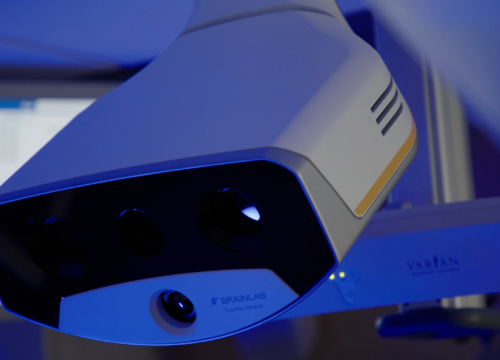Prostate cancer is the most common non-skin cancer found in men, and is most likely to develop after age 50. Men who have a family history of prostate cancer and/or are African-American are at a higher risk for developing prostate cancer.
Prostate cancer patients have excellent long-term survival rates when the cancer is caught and treated early.
Usually, prostate cancer symptoms occur at the later stages of the disease. Prostate-specific antigen (PSA) testing can help detect prostate cancer before symptoms appear. After diagnosis, our fellowship-trained urologic oncologists can help you determine your best treatment options.
Prostate Cancer Diagnosis at Valley
Your physician will likely refer you to a urologist to take a biopsy of your prostate tissue if prostate cancer is suspected due to:
- Rising or high PSA levels in a blood test
- A lump or nodule identified during a rectal exam
- An abnormal MRI
Transperineal Biopsy of the Prostate
In addition to the traditional transrectal method, Valley urologists perform transperineal biopsies of the prostate. During a transperineal biopsy, your doctor will insert a thin needle through the perineum to extract small tissue samples from your prostate. This approach allows for better access to all parts of the prostate and minimizes the chance of infection.
MRI-Guided Fusion Prostate Biopsy
In most cases, you will have an MRI before your prostate is biopsied. This scan will help your doctor look for any suspicious areas in the prostate. If there is an area of suspicion on your MRI, you will have an MRI-guided fusion biopsy using the UroNav Fusion Biopsy System. This system combines MRI images of the prostate with ultrasound-guided biopsy images in real-time.
The UroNav Fusion Biopsy System allows your urologist to accurately perform a biopsy of suspicious areas within your prostate, which results in a more reliable diagnosis.
PSMA-PET for High-Risk Prostate Cancer
We use an advanced diagnostic tool for the detection of prostate cancer and to locate potential metastasized prostate cancer. This tool is called prostate-specific membrane antigen (PSMA) positron emission tomography (PET) imaging. PSMA-PET uses an imaging agent that attaches itself to specific proteins that are present on the surface of prostate cancer cells. As the imaging agent accumulates on these cells, physicians will then analyze the scans to determine if the cancer has metastasized to other parts of the body or returned to the prostate.
Please speak with your urologist or oncologist to see if a PSMA-PET is right for you. A physician's prescription is required.
Prostate Cancer Treatment at Valley
Our multidisciplinary Urologic Oncology team evaluates your entire medical history, including clinical test results to provide you with a comprehensive treatment plan.
Our team will meet with you and a family member or caregiver to answer your questions and give you a thorough understanding of your cancer and what options you have. Prostate cancer treatment options at Valley include the following, depending on your cancer’s stage and your overall health, among other factors:
Active Surveillance
Your physician will work with you to regularly test your PSA level, conduct a digital rectal exam and imaging studies, and repeat a tissue biopsy.
Focal Therapy using NanoKnife®
For prostate cancer that is confined to just one or a few small areas, Valley urologists utilize focal therapy to treat just the cancerous spot(s) of the prostate. Unlike traditional options that treat the entire prostate, focal therapy allows doctors to treat the cancer precisely, preserve the healthy areas of the prostate, and limit postoperative complications, such as incontinence and erectile dysfunction.
Valley urologists use the NanoKnife® System, a minimally-invasive focal therapy that uses electrical pulses to target and destroy cancer cells without harming the healthy tissue around them.
Prostate Cancer Surgery
Prostate surgery typically involves removing the prostate gland, seminal vesicles, and nearby lymph nodes. This type of surgery is known as a radical prostatectomy.
Our Urologic Oncology Center offers prostatectomy through minimally invasive robotic surgery using the da Vinci System.
Benefits of Robotic Prostatectomy Compared to Open Surgery
- Faster recovery
- Shorter hospital stay
- Less pain at the surgical site
- Lower risk of complications
- Quicker return to normal activities
Radiation Therapy for Prostate Cancer
At Valley, we offer advanced radiation options that may reduce many of the common side effects of prostate cancer treatment:
- "Think Five" approach using stereotactic body radiation therapy (SBRT): This approach involves the delivery of only 5 high-dose radiation treatments to the prostate compared to the standard course of up to 45 treatments. This "Think Five" approach allows many patients to complete their entire treatment in as little as one to two weeks.
- SpaceOAR® hydrogel: The gel-like material temporarily moves the rectum away from the prostate during radiation therapy. The gel’s placement reduces the amount of radiation that the patient’s rectum receives during prostate treatments, which can reduce the risk of side effects associated with prostate radiation therapy.
- Prostate fiducials: Small gold markers are inserted into the prostate to help improve the accuracy of radiation treatment.
- ExacTrac Dynamic by Brainlab: We are the first hospital on the east coast to offer new technology that offers unmatched radiation treatment accuracy. This system allows your doctor to incorporate additional views from both outside (surface guided radiation therapy) and inside (image-guided radiation therapy) your body to ensure your treatment is precise to within millimeters — resulting in more accurate treatment and a potential decrease in side effects.
Radiation Therapy vs. Surgery for Prostate Cancer
Both radiation therapy and surgery have similar outcomes for localized prostate cancer (cancer that has not spread beyond the prostate). For this reason, it’s important to make an informed decision about which is right for you.
At Valley, you can meet with both radiation oncology and surgery in one visit through our Urologic Oncology Center. Our prostate cancer experts will answer your questions, walk you through your options and provide the best recommendation for managing and treating your cancer.
Systemic Therapy
Medication therapy options at Valley include:
- Hormone therapy: blocks the hormones that cancerous cells need for growth
- Chemotherapy: destroys cancer cells using powerful medications
- Immunotherapy (biologic therapy): uses the body’s own natural defenses to fight cancer
Why Choose Valley for Prostate Cancer?
- Individualized care using the latest technology: We use the latest technology and treatment options to provide prostate cancer care that’s personalized to your needs and goals. Our experienced physicians will work closely with you to create a treatment plan that fits your lifestyle and family preferences.
- Team approach to prostate cancer treatment: You can meet with our entire multidisciplinary urologic oncology team on your first visit. This integrated approach gives you access to a group of specialists who can answer your questions and go over your treatment options to help you choose the treatment plan that’s right for you.
- Minimizing side effects: We invest in advanced technology to minimize treatment side effects for our patients, such as erectile and bowel dysfunction. These advancements include minimally invasive robotic surgery and radiation procedures that increase the accuracy of treatment, shorten treatment time in some instances, and minimize damage to healthy tissue.
- Clinical trials: We offer clinical trials that allow our patients access to new, life-saving treatments before they are available anywhere else.
- Nurse navigator: Before your first visit, our nurse navigator will call you to conduct a comprehensive phone interview and obtain the relevant medical information. We will also make arrangements to obtain needed reports and imaging. Our nurse navigator facilitates your care from diagnosis to treatment.





























